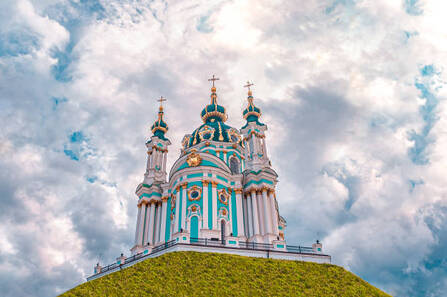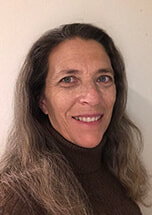 St. Andrew's Cathedral St. Andrew's Cathedral By HANNA BROADBRIDGE This bon mot was said to come from the Danish painter and verbal comedian, Storm P, born Robert Storm Petersen, who became known for his humorous writings and cartoons, all with more than a touch of seriousness and deeper meaning. A few weeks ago, life looked peaceful and full of hope for many of us after the long Corona period of ups and downs, lockdowns and masks. Spring was in the air, children were beginning to play noisily in the streets, full of their usual joyful exuberance. Even going back to school was felt to be a good thing, many of them said. And then suddenly the world woke up to a new world order. No one could believe that more than seventy-years since WWII we would be back in wartime in Europe, full of frightening memories of air-raid warnings, shelters, and various ways of evacuating women and children. As an elderly lady from Denmark said to me the other day: ”I went to bed one night in 2022 and woke up the next morning in 1939.” Fear and uncertainty has spread everywhere like wildfire. And people literally ran away from their homes, jobs, family, and friends, leaving the men behind to fight the enemy, and only stopped to queue at stations and borders with one private bag or small suitcase hoping to enter anyone of the western countries bordering on Ukraine. As of today when I write this, 2.9 million people have become external refugees, hoping to find a new home, temporary or permanent, and wishing it to be in a nearby country. An even bigger number of women and children are at the moment internally displaced persons in the small towns or the countryside, who may also one day leave their country to find peace elsewhere. Such a mass movement of people looking for safety and security has not been seen since WWII, nor have we seen such kind generosity being shown toward these needy and traumatized people by the Poles, the Slovakians, the Hungarians, and the Moldovans and other Europeans further west. Everybody has opened up homes and hearts and shown a helping effort, while the war has become more and more cruel and abhorrent. The EU and other Western countries have moved extraordinarily fast to secure aid and support for the needy and to stop Russia from its plans to take and conquer Ukraine, by using diplomatic and, not least, economic and financial means. NATO is supporting the border countries with military assistance, as they all feel that the Russians cannot be trusted. The Russians accuse the west of using illegal arms, weapons, and chemical means, which is, as far as we know, not so. But there is a saying in Danish: Tyv tror hvermand stjæler. (A thief believes that everybody else is stealing.) The situation may look very different by the time you read this. Ukraine is a country that has had a hard fate. It was the heart of Russia for many years, after a fair contingent of Vikings had come all the way from Scandinavian countries down the rivers and settled in and around the Black Sea at the end of the ninth century. (A well-reviewed exhibition called RUS is currently attracting high numbers of visitors at Moesgaard Museum outside Aarhus right now, giving a new perspective on the reach and extent of the Viking culture and traditions.) St. Andrew’s Cathedral in Kiev marks the place where Saint Andrew erected the first Christian cross. Kiev has therefore been the religious center of the Russian Orthodox Church since 988, but soon after, Ukraine became the football that was kicked about by various ducal and imperial powers who all wanted access to the crops and minerals that Ukraine had, thus losing its nationhood and suffering in more recent times from the dreadful famine brought about by Stalin in the 1930s, followed by the destruction during WWII by mainly the Germans. Remember Babi Yar, the execution of more than 33,000 Jews in 1941 in a horrible mass shooting into the now (in)famous ravine near the city. Ukraine continued as part of the Soviet Union until that fell apart in 1990-1991, and when the areas that still had a sense of their own culture and nationhood voted for independence, Ukraine became a new nation (73 percent voted for independence) in 1991 with a future full of hope, but with the first task to shake off the corruption that had found its way into most corners of their society. This brave young nation has come a long way, enjoying the independence and possibilities. But Putin saw, partly as a result of his (false) sense and belief that the West was weak, both militarily in the NATO countries and financially in the EU countries, that his time had come to unify Russia with its “homeland,” Ukraine, using ancient and confused interpretations of history. He probably also wanted to have access to the fertile cornfields and the Black Sea . One of Putin’s reasons for the invasion is that Kiev has the mother of the Russian Orthodox church and thus holds the most sacred church in the whole of Russia. In Ukraine, the Orthodox church has established a break-away church, as they have felt that the Moscow patriarchate has become too political and too reactionary. The interest in this new religious independence was helped by the many priests who had been in exile in the USA. The Christian church has more or less split in three: a semi-independent Orthodox church under the Moscow patriarchate, an independent but not universally recognized Ukrainian Orthodox church, and the remains of the old Greek-Catholic church. People whose allegiance is with the Russian Orthodox church find that Western values in almost all areas are decadent and go against the true understanding of Christianity. This is where paths may divide. Land, church, and people—and now also the party—belong together, and therefore the liberal and free ways of modern times upset this triangle. Religious freedom involving Western churches and ways goes against the Russian truth. In 2018, the Ukrainian Orthodox church split from the Moscow patriarchate and was warned at the time by the present patriarch, Kirill of Moscow, that this would lead to bloodshed. It therefore began proselytiszng in Africa and setting up its own dioceses there. Patriarch Kirill in Moscow has strong control of the many Ukrainians who so far have seen the Moscow-affliated church as the true church, but his link to President Putin and the voice that he has uttered in favor of the war has widened the gap between the churches. “How can one support a church that politically sets out to destroy its brothers and sisters that once were united?” The Kiev patriarch, Epifanus, has encouraged Ukrainians to fight for their country, for freedom, and for dignity as a nation and a country. Orthodox churches in Europe, aligned to the Moscow patriarchate, are beginning to break their affiliation with Moscow, and no doubt there will be more. For Russia, one element of the prize of this war is to control Kiev and thus control the mother church in Kiev for all Russians. For the Ukrainians, the prize is to win the war and to keep their territory, their identity, and their freedom. There is growing support among Orthodox priests, including in Russia itself, to show disapproval of the war. Even stronger are the voices of priests in Ukraine who want the freedoms that are necessary to build their nation, faith, and future. Ten years ago, I heard that there was some interest from Ukraine in Grundtvig as a nation builder. I wonder how far they have come with the dream. The next language for translation of Grundtvig may have to be Ukrainian! Whatever the situation will be when you read this, your prayers will be welcome. hanna@broadbridge.dk
0 Comments
|
Editor InformationBridget Lois Jensen Archives
March 2023
|
Subscribe | Gift |
Submit an Article |
Contact |
© COPYRIGHT 2019 CHURCH AND LIFE.
|

 RSS Feed
RSS Feed